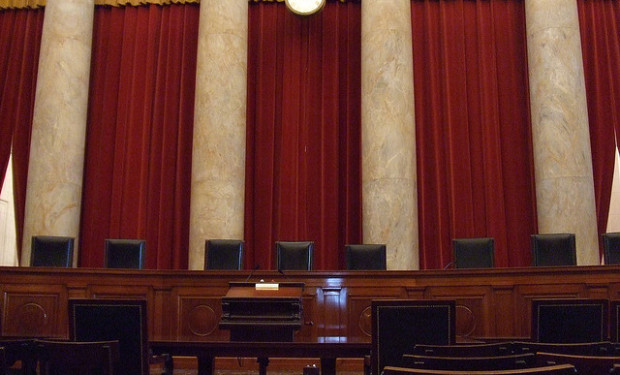Statutory Construction of Four Key Words to Decide the Fate of the Affordable Care Act
What does it mean for a health insurance exchange to be "established by the state?"
This article is the third in a three-part series on the most recent Affordable Care Act case to be heard by the U.S. Supreme Court, King v. Burwell. You can read Part One and Part Two here.
Last week the U.S. Supreme Court heard “one of the most anticipated arguments of the term” regarding the Affordable Care Act (“ACA”). The arguments, which stretched beyond the one-hour limit, centered around four critical words of the statute – “established by the state.” The nine justices took on the issue of whether exchanges “established by the state” also included federal exchanges established by the Department of Health and Human Services (“HHS”).
The case, which largely hinges on statutory interpretation, could result in the loss of insurance for millions of Americans who purchase health insurance through federal exchanges if the Court sides with the petitioners. Michael Carvin, representing the petitioners, tried to convince the Court that his interpretation of the Act would not lead the insurance market into a “death spiral”(pdf) as Justice Sotomayor had feared.
Carvin, who came across as “impatient” during oral arguments as the Justices tried to slow him down, battled a barrage of questions concerning unconstitutional coercion and the primary purpose of statutory construction. At the core of Carvin’s argument was, “saying that HHS will establish such an Exchange does not suggest that the State has established such Exchange” to which, Justice Kennedy responded, “under your argument, perhaps you will prevail in the plain words of the statute, [however], there’s a serious constitutional problem if we adopt your argument.” Justice Kennedy was primarily concerned that forcing states to choose between setting up an exchange or having individual insurance markets collapse amounted to an unconstitutional coercion by the federal government.
Justice Kagan highlighted the principles of statutory construction focusing on the whole text and making “everything harmonious with everything else” rather than just looking at four words. She posed a hypothetical to Carvin attempting to demonstrate the structure of the ACA, which requires the federal government to step in when states decline to establish their own exchanges. Her hypothetical, based on law clerk assignments, highlighted the fact that where one law clerk is unable to write a memo, it is imperative that another law clerk step in to write the memo and complete the task. Similarly, if a State is unable to establish its own Exchange, or chooses not to, then the ACA requires that HHS to step in as a substitute and establish an Exchange within that State.
While Carvin fielded questions from the liberal justices, Solicitor General Donald Verrilli faced tough questions from Justices Scalia and Alito in defense of the ACA provisions. The government’s core argument was that the phrase, ‘Exchanges set up by the state’, included those established by HHS. Leading the Court into the plain meaning of the statute, Verilli defended the government’s position by reading Sections 1311(b)(1) and 1321 in tandem. Specifically, Section 1311(b)(1) states, “[e]ach State shall establish an American Health Benefits Exchange for the State.” Additionally, Section 1321 provides the means by which a state shall establish an exchange – so, if a state elects not to establish an exchange, it can meet the Federal requirements by having HHS establish an exchange within that state. Verrilli explained, “what HHS is doing under the plain text of the statute is fulfilling the requirement of Section 1311(b)(1)” by setting up an Exchange where a State elects not to. Verrilli noted, “for that reason, we say [the Federal Exchange] qualifies as an Exchange established by the State.”
Addressing the government’s fear of millions of Americans losing health insurance if the Court upholds the petitioner’s arguments, Justice Scalia noted that Congress would not sit silent with such a disastrous outcome. Chief Justice Roberts, who cast the swing vote in 2012 to save the ACA, said almost nothing on March 4 and did not in any way allude to his position. The opinion, anticipated in late June or early July, will likely be closely divided.





